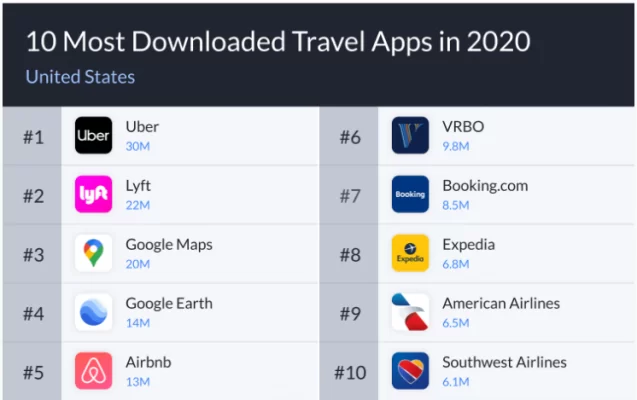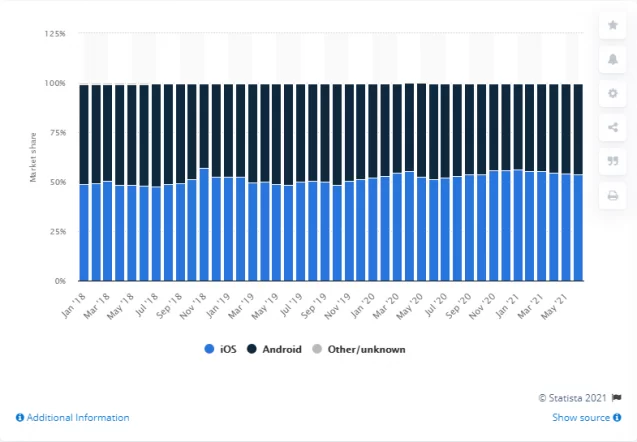Digital technologies continue to penetrate all areas of our life, including healthcare, education, real estate, and many others. There are more than 7 billion mobile users in the world today, who want to do everything on the web – buy and sell goods, order services, make payments, and even rent housing. Therefore, every company should think about creating its own web application in order to attract more new customers, increase the loyalty of old ones, and expand their business. In our article, we’re going to talk about the development of real estate rental apps, their benefits for landlords and renters, their must-have features, and their design.
Why Do Americans Need Apps for Apartment Rental?
The US rental property market stays in demand in spite of the pandemic limitations and global crisis. Its value stood at almost $170 billion in 2021, according to Ibis World. Americans prefer to rent housing rather than buy, which is confirmed by data provided by Brookings. According to their research, a third of families in the United States lived in rented housing over the past 50 years. This is explained by lower monthly payments in contrast to the housing purchase, reluctance to get attached to a certain place, as well as the convenience of living in apartment complexes.
iPropertyManagement found out that 109 million US residents rent their houses. The following figure shows that almost 35% of renters are under 35 years old.

Source: iPropertyManagement
According to the Pew Research Center’s survey, 95% of these people have smartphones. OK, Google, what will they use to look for apartments? Obviously, their smartphones! That’s why the rental housing market participants should provide millennials with modern solutions that will allow them to quickly and smoothly find apartments.
New technologies and digitalization help rental property businesses develop and bring their services to the next level. Using mobile applications, landlords and renters can interact with each other anywhere in the world, collect and save huge databases, search for options even faster, instantly send and receive payments, and do other tenancy-related things. For instance, Airbnb, one of the largest property management platforms, earned $3.4 billion in 2020 and has 150 million users. Let’s see what benefits does a rental mobile app offer?
Key Advantages of Using Online Rental Platforms
The US rental housing market experienced a downturn in Q2 and Q3 2020 due to the COVID-19 pandemic. It seems the industry is ready to rise again because vaccinations make people come back to cities and rent houses. User-friendly apps are waiting for them offering the following benefits:
Online Communication
According to statistics, 75% of customers choose online chat for communication since it provides almost instant answers. In addition, a potential client can interact with the company and simultaneously explore listings. Online chats allow users to quickly get advice, while landlords and property management companies have an opportunity to accelerate the process of communication with leads and raise the conversion level.
Moreover, online chats increase the average duration of stay of your customers on the platform, which has a positive impact on the search rankings. You will be able to receive and process personal data, such as emails and phone numbers for further communication. Thanks to online chats, you’ll keep potential clients who don’t want to call you or wait for the free operator’s reply.
Convenient Housing Review and Selection
The rental housing services allow realtors and landlords to promptly submit the necessary information from a common database, thereby increasing the loyalty of their customers. Users, in turn, will get up-to-date data and a possibility to make the right decision. The Hubspot experts revealed that 33% of people don’t want to wait on hold. Their frustration may bring them to your competitors. The mobile app allows you to keep the customers at the expense of the fast information receiving. People will save their valuable time, while your business will improve reputation and increase profits.
Seamless Payments
Mobile rental apps allow users to make online payments without the necessity to leave the platform. They don’t need to go to the bank and spend their time sitting in the queue, which is especially dangerous during the COVID-19 times. The app owners can charge transaction fees and make a profit. Besides, landlords will appreciate this feature thanks to the ability to receive payments in a safe, convenient, and fast way.
Comfortable Management
This feature will be useful for both landlords and tenants. Renting out real estate requires solving a large number of issues, which include obtaining rent, setting vacancies, scheduling meetings with potential renters, working with a cleaning service, finding tenants, and so on. The mobile application will promptly remind you of the scheduled actions and allow you to automate routine work.
Using the app, tenants will be able to track apartments they like, add them to their favorites, make payments, view apartment reviews and information about the landlord, schedule appointments, and take virtual tours, which we’ll talk about later. For example, Airbnb and VRBO headed the list of the most popular travel apps in the United States prepared by Apptopia.

Source: Apptopia
Push Notifications
Users can be notified of new apartments, price changes, important announcements, updates, new features, and more. On average, a smartphone user receives 46 push notifications per day. Push notifications should not be intrusive and excessive. They should contain only the information that will interest the user. It’s also necessary to provide customers with an opportunity to turn off push notifications. Besides, the interface of your app should allow users to easily find the necessary buttons. Don’t bombard them with push notifications at the wrong time. Track user behavior in the application to better understand their interest and send the necessary notifications.
Virtual Tours
In addition to the standard set of features, the housing rental application allows users to remotely view the layout of the property, thereby saving the time of the realtor and the client, the landlord and the tenant. Virtual and augmented reality technologies help to provide services at a new, modern, and advanced level. You no longer need to go around the many suitable options, it’s enough to open a mobile app and evaluate the available apartments. More than 90% of people between the ages of 53 and 71 consider this feature as one of the most attractive. Another research demonstrates that terms like “apartment virtual tours” grew by 222% from 2019 to 2020.
Real Estate Rental App: Must-Have Features
According to the following data, 56% of customers remove their applications within one week of installation. Surely, you don’t want your solution to get in these sad statistics. Therefore, your app should meet all users’ expectations and demands. Its task is to solve their problems and help them find the best place for living. Your housing rental app should have the following features:
Smooth User Onboarding
People don’t want to spend a lot of time signing up for the mobile app. 70% of users are ready to uninstall the application if it takes too long to load. They hardly want to insert tons of data to register. Don’t make the registration form too long and detailed. It will be enough to ask users to enter their logins, passwords, and email addresses. Provide an autocomplete feature or allow people to sign up using their social network accounts, such as Facebook or Twitter.
User Profiles
Allow landlords, tenants, or real estate agents to create profiles in your app. Property owners will be able to meet potential renters in advance, while tenants will be able to review the apartments, save the favorites, and chat with landlords or realtors.
Database and Listings
Your application should include databases with thousands of apartment options, allowing users to study the listings. The platform should be able to instantly receive streaming data, quickly process large amounts of information, and provide access to data within a second.
Cost Calculator
Users should be able to calculate the rental cost. This feature will allow people to quickly find the proper option, get the final cost including taxes, fees, and so on, as well as receive up-to-date information. For example, Zillow, one of the most popular rental apps, offers tenants this feature.
Interactive Maps
Make sure that your app will have interactive maps to provide users with comprehensive information about the real estate location. Tenants would like to know everything like infrastructure, bus stations, nearby schools and kindergartens, parks, crime rate, the average income of their future neighbors, and other relevant data.
Push Notifications
As mentioned above, push notifications will inform users about price changes, updates, new listings, scheduled meetings or calls, and so on.
Virtual Tours
Provide your users with an opportunity to make a 3D tour around apartments and expand their experience. Make use of all benefits offered by VR technologies and other advanced solutions. Photos and videos aren’t able to give a sense of a real visit and a chance to fully estimate the apartment.
Ease of Use
Your app should have simple and understandable navigation. Users should not puzzle over which button to press and which section to go to. In addition, think about voice input and dynamic font support features.
Safety
The rental application must be secure and comply with the privacy policy, as well as be able to delete personal data. Make sure that it has all protection measures, such as multi-factor authentication, data encryption, fingerprint scan, and so on.
Cross-Platform Functionality
Provide both Android and iOS versions of your rental mobile app to meet the demands of users of both operating systems. The Eligraphics shows that iOS occupies 53.7% of the mobile OS market in North America, while Android accounts for 46%. If you want to cover a huge audience, develop two versions of your future rental app.

Source: Statista
Are There Any Alternatives for Those Who Don’t Want to Rent Housing?
There is a category of people who, for some reason, don’t want to rent a house. Those who can’t afford to rent for the long term are looking for different options that would allow them to pay much less for housing. To get a roof over their heads, they go to work as apartment complex managers, live with and look after elderly persons, work on cruise ships or in hostels, become lighthouse keepers, or work on a farm.
These people need specialized platforms or applications to find suitable options as well. Match AuPair is one of these solutions. It’s an app that allows users to find a family looking for a nanny for their children. Such babysitters usually live with a family, receive a salary, and look after the children. Who knows, maybe you’ll want to bring such an app to those who are looking for renting alternatives?
Wrapping Up
As we can see, the US rental housing market is in demand now and provides businesses with a lot of ways to make a profit. Creating rental mobile apps is one of these possibilities. A good solution should have the following basic features: search filters, detailed listings, online chats, cost calculators, 3D tours, and others that will be useful for both landlords and tenants. Nowadays, people use smartphones to find the required information and solve their problems as quickly as possible. Therefore, your app should be able to help them and provide them with a pleasant and effective user experience.
Are you planning to build a rental app? The Elinext team is ready to give you professional advice in this field. We developed Vacation Rentals Guide App for iOS and Android platforms that was downloaded more than 50,000 times and well received by users. Contact our specialists for more details!









